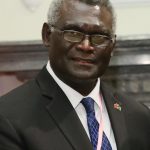Politics
Solomon Islands Politics
This page explores Solomon Island’s political structure incorporating real-time RSS feed news and videos. By harnessing the power of RSS feeds, visitors can stay informed about the latest developments in Solomon Island’s politics as they happen. The dynamic nature of these feeds ensures that users receive up-to-the-minute updates on political events, policy changes, and significant milestones, enabling them to stay abreast of the ever-evolving political scene.

Manasseh Sogavare
Prime Minister of Solomon Islands
Incumbent
Assumed office
24 April 2019
Image credit
The Solomon Islands, an archipelago nation located in the South Pacific, has a parliamentary democracy within the framework of a constitutional monarchy. The country gained independence from the United Kingdom in 1978 and operates as a sovereign nation with its own government.
The political system of the Solomon Islands is based on a multi-party system, with the Prime Minister serving as the head of government. The Parliament of the Solomon Islands consists of elected representatives from various constituencies. Members of Parliament are elected through a first-past-the-post system, and the Prime Minister is elected by Members of Parliament.
Ethnic and regional diversity plays a significant role in Solomon Islands politics. The country is home to multiple ethnic groups and languages, contributing to a vibrant and diverse political landscape. Regional political parties and interest groups often advocate for the interests of specific provinces or ethnic communities, reflecting the decentralized nature of governance in the Solomon Islands.
The country faces various challenges, including economic development, infrastructure development, and addressing social issues. The Solomon Islands has a resource-based economy, with agriculture, forestry, and fisheries being important sectors. Efforts are being made to promote sustainable economic growth, attract foreign investment, and reduce poverty through targeted development initiatives. Political stability and national unity are crucial for the Solomon Islands. The country has experienced periods of political unrest and tensions, particularly in the early 2000s. The Regional Assistance Mission to Solomon Islands (RAMSI), a multinational security and development intervention, played a significant role in restoring peace and stability.
The Solomon Islands also faces environmental challenges, including climate change and the preservation of its rich biodiversity. The government has been actively engaged in international forums to address these issues and promote sustainable development practices. Efforts to strengthen governance, foster transparency, and combat corruption are ongoing priorities for the country. International partnerships and aid support play a significant role in assisting the Solomon Islands’ development agenda and addressing its challenges.
In conclusion, the Solomon Islands operates as a parliamentary democracy with a multi-party system, navigating the complexities of ethnic and regional diversity. The country is working towards sustainable economic development, social progress, and strengthening governance to ensure a stable and prosperous future for its citizens.
Unless other sources are cited, original content is provided by ChatGPT. ChatGPT may produce inaccurate information about people, places, or facts. #SolomonIslands #SolomonIslandsPolitics #SolomonIslandsNews #SolomonIslandsNewsToday #SolomonIslandsRSSFeed #BlahFace



